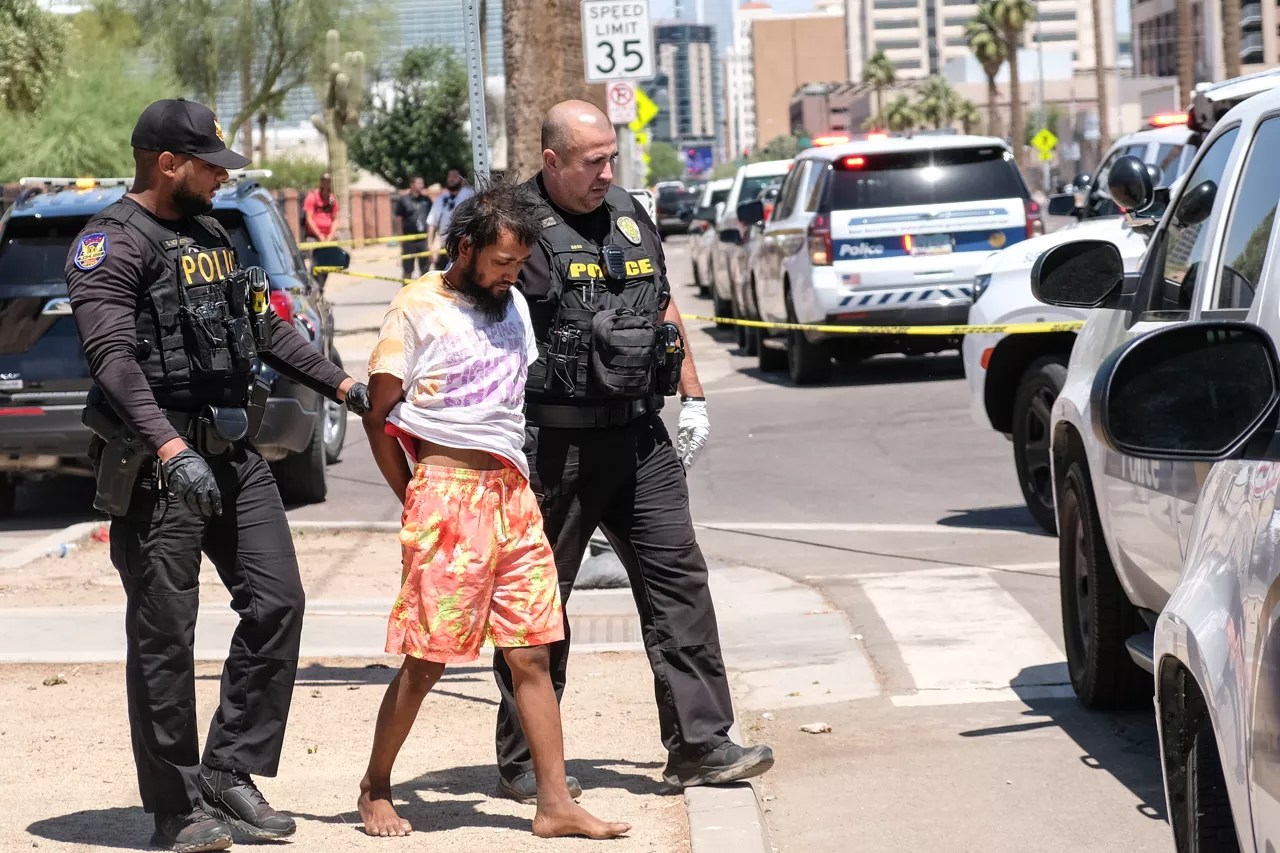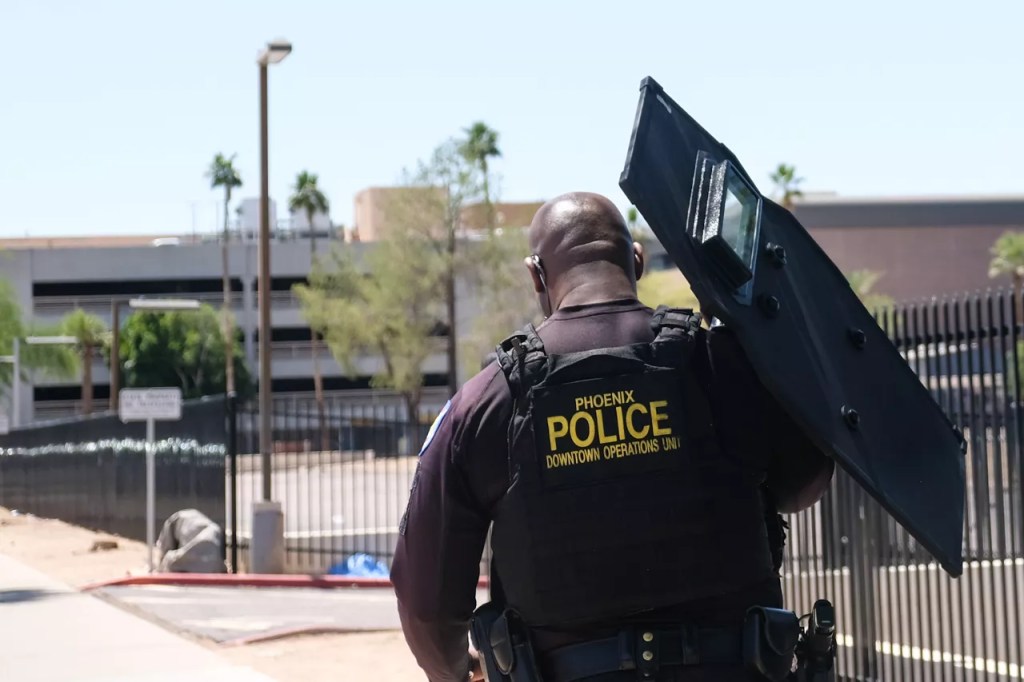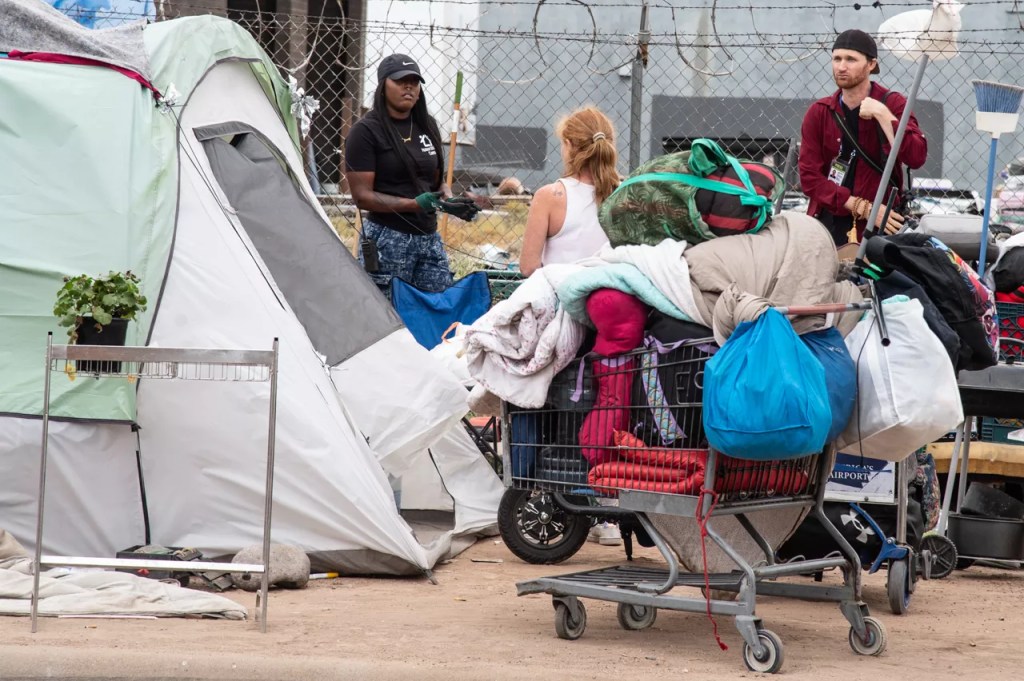
Katya Schwenk

Audio By Carbonatix
In June 2024, the Department of Justice issued a damning 126-page detailed report outlining the Phoenix Police Department’s pervasive constitutional abuses, including against unhoused people. Per the DOJ, Phoenix police regularly stopped homeless people with no justification, aggressively cited them for trespassing and regularly destroyed their belongings with no due process.
“Banishing homeless people from public spaces by unlawful means, destroying their property, and cycling them through the criminal justice system does not solve the problem or address its root causes,” the DOJ report read. “And in Phoenix, it has led to a pattern of constitutional violations.”
Now, with a draft policy currently up for public input through Dec. 13, Phoenix police appear to be addressing those serious criticisms. The document, dubbed the “Interacting with Individuals Experiencing Homelessness” policy, lays out how police officers should conduct themselves when dealing with unhoused people. As with the police department’s new “Youth Interactions” policy, which it released last month, Phoenix police did not have a preexisting homelessness policy, according to police spokesperson Sgt. Brian Bower.
Much of the new policy’s guidance reads as a direct response to the DOJ report. It instructs officers that they should not detain people for being homeless and should not destroy their property because they are homeless, among other things.
Ben Jeffrey, an unhoused advocate who has worked directly with the Valley homeless population for more than five years, said he’d give the new policy “a B or maybe a B-plus.” He welcomed the department’s goals, but said he’s skeptical that the policy will materially change how police treat the city’s unhoused. Jeffrey called the policy “ambiguous, cloudy and gray” and said it relied too much on wishy-washy “may” and “shall” language, while giving the department “all the wiggle room” they need to still overpolice the unhoused.
“They’re just shuffling around unhoused people and their belongings with a nicer script,” Jeffrey said, calling the document a “more polite, thoroughly documented way to separate homeless people from their belongings.”
Here’s what the new policy says, and how it reflects the troubling findings of the DOJ report.

Katya Schwenk
Unlawful stops
The DOJ found that Phoenix police “often stops unhoused people for investigative purposes without reasonable suspicion” and that cops initiate those stops “based on indications that the person is homeless, even when they are lawfully present on city property.”
That includes what was a widespread practice of waking sleeping unhoused people early in the morning to check their names for warrants and tell them to relocate. In other abuses, a Phoenix cop “stopped his squad car when he saw a man who appeared to be homeless balancing his belongings while riding a bicycle.” One episode involved the illegal detention of two people, who were sitting in the shade on the side of an alley, on top of large chunks of concrete too heavy to move. An officer cited for “lying or sitting on a public right of way,” even though they were impeding nobody.
The new policy notes that police may approach unhoused people whenever they are in a place that officers have a right to be, but that those encounters must be voluntary unless the officer suspects illegal activity.
“If an individual experiencing homelessness declines to engage by word or action in a consensual contact, employees will discontinue the contact,” the policy states.
The policy also says officers should, “when practicable…offer to connect individuals experiencing homelessness with services during encounters” rather than attempt to suss out if they can be cited for any offense. Relatedly, the DOJ report included several examples of officers seeking to cite unhoused people rather than connect them to resources like shelters and mental health clinics.
The DOJ report included a 2020 incident in which officers tried to detain an unhoused man for supposedly trespassing at a convenience store, despite no one having called the police. When the man questioned their authority to stop him, officers grabbed him, knelt on his neck and fired a Taser at him. They then arrested him for resisting arrest and trespassing, though one officer admitted at the time that the charges “were a little bit iffy.” Prosecutors turned down the case.
The new policy says that officers “may use their discretion and offer to connect individuals experiencing homelessness with services in lieu of citation or arrest for petty and misdemeanor offenses that occur on public property,” though the policy stops short of requiring them to do so.

O’Hara Shipe
Destroying property
The DOJ report also outlined how Phoenix cops routinely destroyed the property of unhoused people, either by giving them little time to claim or move it or by failing to impound it after an arrest.
Among the items the DOJ reports were tossed: tents, clothing, medication, identification, phones, court documents, medical paperwork, social security cards and family photos. One unhoused man told investigators that cops threw out an urn containing his dead relative’s ashes.
“People experiencing homelessness do not lose Fourth Amendment property rights to their belongings, even if they leave them temporarily unattended on the sidewalk,” the report read.
The new policy notes that officers may move the property of unhoused people off streets or other thoroughfares if it presents a safety hazard, but says cops “should not destroy or discard the personal property of an individual experiencing homelessness.”
The DOJ report included many examples of officers doing just that. From 2020 to 2022, when the unhoused encampment known as the Zone was active, cops routinely threw away personal property during regular sweeps of the area. The DOJ said police gave unhoused people living there little notice or time to move their things.
The new policy now says cops should “give the occupants a reasonable opportunity to collect and transport personal property.” It also says officers “will use reasonable care when handling, collecting, and retaining the personal property of individuals experiencing homelessness” — specifically, making sure to impound it when arrests are made.
Especially prior to 2023, the DOJ wrote, Phoenix police had a horrible track record of doing so, instead “forcing people to abandon their belongings on the street.” In one instance, officers “illegally arrested” seven people sleeping on a sidewalk, tossing their belongings rather than impounding them. When one woman pleaded with them to stop, one officer told another, “This is all junk. There’s nothing.”
The new policy now requires officers to “give the arrestee a reasonable opportunity to identify items of value to be impounded or arrange for the care of the arrestee’s personal property” and “ensure cash, credit cards, jewelry, identifying documents, cell phones, and items of value that are not evidence are transported” to jail along with them. Officers are similarly obligated to arrange for the care of an unhoused person’s property when they are being taken to a treatment facility rather than jail.
Officers must ensure their body-worn cameras are recording when taking those steps.